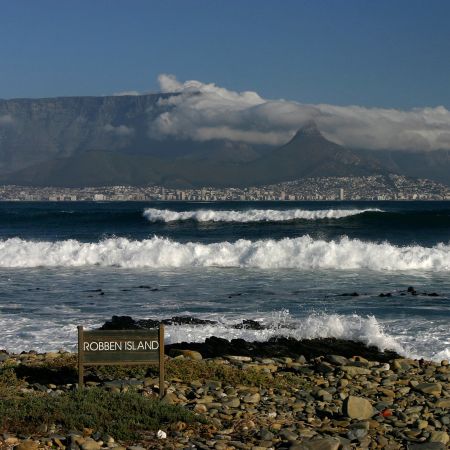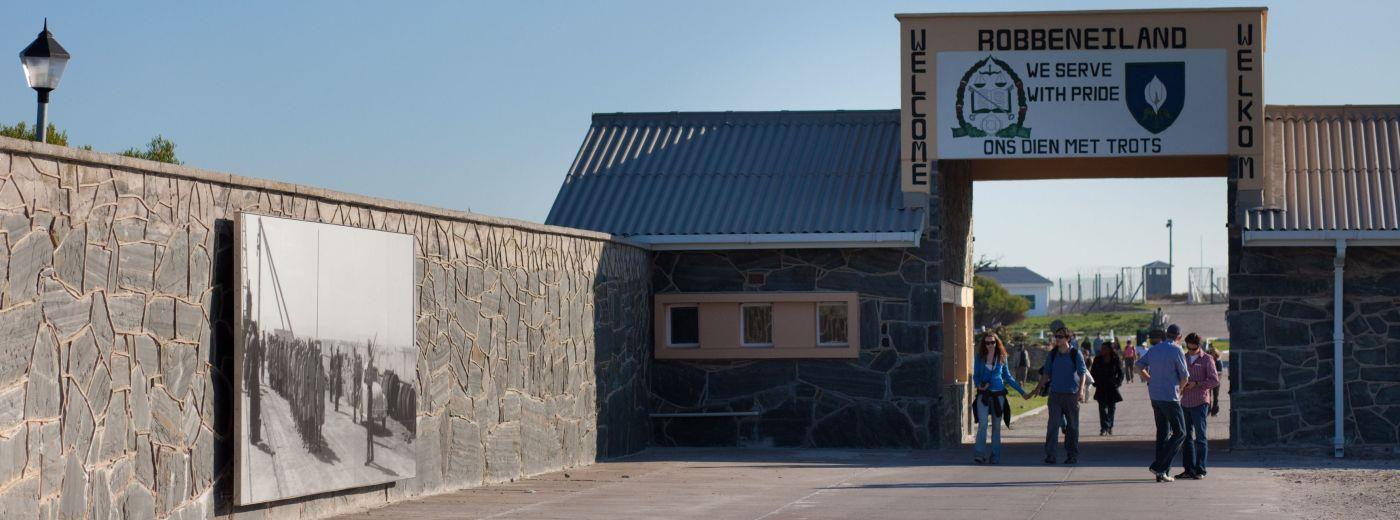Introduction
Robben Island, just off the coast of Cape Town, is a boat ride across the Bay from the V&A Waterfront, and is famous for its history as a place of exile, banishment, isolation and imprisonment. In the 17th century, Jan van Riebeeck confined the first prisoner on the island, and many more followed. Slaves, political and religious Muslim leaders who opposed Dutch colonisation, leprosy suffers, mentally disturbed patients and prisoners of war were all detained indefinitely on the island over the years.
 From 1960, the island became known worldwide as the brutal gaol for political prisoners who opposed the apartheid regime in South Africa, many of whom are today prominent members of the present African National Congress government.
From 1960, the island became known worldwide as the brutal gaol for political prisoners who opposed the apartheid regime in South Africa, many of whom are today prominent members of the present African National Congress government.
Two of the most famous prisoners are Nelson Mandela, who was detained on Robben Island from 1964 until 1982, and Robert Sobukwe, the leader of the Pan-Africanist Congress. With the demise of apartheid, the last prisoners were released from the island in 1991. In 1997, the Robben Island Museum opened to the public, and in 1999, the island was declared a World Heritage Site.
Visiting Robben Island
The undisputed 'highlight' of the tour to Robben Island is a visit to the former maximum security prison, including the small cell where Nelson Mandela was held for 18 years. Your guide around the prison camp is likely to be one of the many former political prisoners who were imprisoned on the island and subjected to the terrible conditions.
You may be shocked as your guide explains what his daily routines were, shows you his confined living areas, and describes the punishments administered to prisoners from time to time - and equally surprised that he bears no grudges and is able to return to the place where he spent many years as an inmate. His reason will be that the memory of the island is the future for the new South Africa, and a permanent reminder of the struggle for freedom.
The entire visit is unbelievably moving and you will come away feeling privileged to have had a personal insight into the island and its role in history. Also included is a 45 minute bus tour around the island, which includes a visit to the limestone quarry where prisoners laboured daily, the prison house of Robert Sobukwe, the African penguin colony, and a viewpoint looking across the Bay to Cape Town and Table Mountain.
Especially in the busy holiday periods, advance bookings are advised. Please note that you must now provide identification when purchasing a ticket. This could be a passport, identity document, birth certificate, or driver's licence. The ticket MUST reflect the customer's full details - so first name and surname. Anyone visiting the island must also ensure that they have their ticket and the identification used to make the booking at hand at all times to be checked before and after boarding the ferry - should the ticket not correspond to the passenger's proof of identification, then they will be turned away.
Wildlife and the Island
The boat trip between Cape Town and Robben Island provides an opportunity to see a wide variety of seabirds and marine mammals including Cape Fur seals, Southern Right whales and Dusky and Heaviside dolphins. Once on the island, you will be able to see some of the 23 species of mammals which have been recorded including small herds of bontebok, springbok, steenbok, and eland. An increasing number of ostriches, lizards, geckos, snakes and 3 species of tortoise can also be found, and the island is home to about 132 bird species. The African penguin is a species that was abundant on the island in the 17th century but was brought to extinction in the 1800s by human activities. By 1983 the penguins were introduced and now have established themselves as a large breeding population. They are a favourite attraction for visitors to the island.

